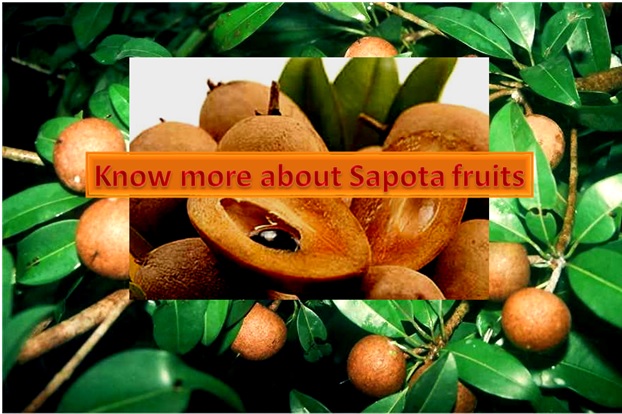
Wonderful fruit : SAPOTA (SAPODILLA, CHIKKOO)
Chikkoo or sapota (sapodilla, Manilkara zapota) are sweet and tasty fruits with unique musky flavor. This fruit has its origin in Central America particularly in Mexico and Brazil. It is a popular fruit in India and other Asian countries. Fruits are oval shaped berry with brown skin. Young fruits have hard surface and white pulp with white sticky latex. Ripened fruits will have brown color flesh, which is slightly grainy and will contain black shiny seeds. Surface skin is easy to peel and fruit is very tasty. Certain varieties of sapota have reddish color flesh.
Sapota is also known as sapodilla is rich in calories and its sweet flavor can be attributed to the presence of simple sugars like fructose and sucrose that replenish energy and revitalize the body. This fruit has amazing health benefits.
1. Digestion : Chikkoo is rich in dietary fibre, may be used as a good natural laxative. Both the flesh and peel of this fruit can be easily eaten and digested by human beings.
2. Anti inflammatory : The anti-inflammatory properties of tannins present in Chikoo reduce the chances of erosive gastritis, enteritis, irritating bowel and gastric disorders.
3. Colon health: It protects the inner lining of the mucous membrane of colon from carcinogenic toxins.
4. Nutrient source: It contains minerals such as potassium, copper, iron, folate, niacin, and pantothenic acid which are good for many metabolic body activities. It also containsvitamin E, vitamin A, vitamin C, and vitamin B complex. These vitamins and antioxidants boost immunity of the body and also good for hair and skin.
5. Fruits of sapota has a very high amount of glucose in it. One single chikkoo fruit can replenish all our body’s sugars in matter of few minutes. It is good for pregnant women and growing children who need extra energy.
6. Cardiac health: Vitamin E in Chikkoo has a chemical compound alpha-tocopherol that might reduce the risk of developing heart diseases.
7. For skin health: Vitamin C present in the fruit helps to improve your immunity and also protect you from gout and cataracts. Vitamin C, also good to provide shining skin. The Vitamin E in this fruit moisturizes your skin, thus giving you healthy and beautiful skin. Hence, eating sapota fruit is good for the skin.
8. Anti aging fruit: Therefore, it acts as an anti-ageing agent by eradicating free radicals in the body which are responsible for enhancing the ageing process. It is also effective in reducing wrinkles.
9. Control indigestion in children: Boiled Semi-liquid of these fruits skin may be given to children to control loose motion.
10. Helps in congestion and cough: Sapota known to reduce cough and congestion and it is a good expectorant removal.
11. Diuretic in nature Helps in urination process and prevents water retention in the body.
12. Control of nausea :During pregnancy iIt helps in overcoming nausea and dizziness.
13. Seeds benefit:
• According to traditional method chikkoo seeds crushed and eaten, helps in removal of kidney and bladder stones because of its diuretic in nature.
• The seed kernel oil of sapota is used as a skin ointment. The residue of this seed, after the extraction of oil, can be applied as a poultice on painful skin afflictions.
14. White latex: The latex of sapota plant can be used to remove warts and fungal growth on the skin.
15. Anxiety control: Chikkoo has the capacity to calm nerves and also to help reduce stress. People who are prone to anxiety should have this fruit as to reduce anxiety and stress levels.
16. Good for bones: One main health benefit of sapota is that it is rich in calcium. This extra calcium helps to strengthen bones. Women who are prone to osteoporosis should have more .
17. Good for vision: Presence of vitamin A in chikkoo helps in improving vision.
18. Dishes: Fruits can be used to prepare smoothie, ice-cream, juice, jam, halwa (sweet dish) etc.
Caution: People who have diabetes should consult their physician regarding whether they can consume sapota fruit.
Author: Sumana Rao | Posted on: May 17, 2016
« World’s first Ayurvedic surgery performed in India ! Latest News: HIV contaminated blood transfusion in India »






















Write a comment